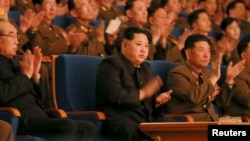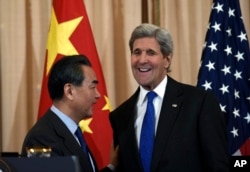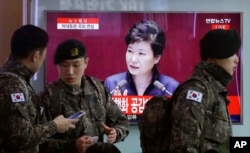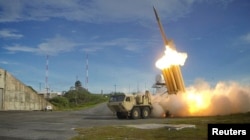The United States will submit to the U.N. Security Council a draft resolution calling for new sanctions on North Korea for its recent nuclear test and long-range missile launch.
The move Thursday comes a day after the U.S. and North Korea's most important ally, China, agreed on imposing further sanctions on Pyongyang.
"We look forward to working with the Council on a strong and comprehensive response to the DPRK’s latest series of tests aimed at advancing their nuclear weapons program,” said Kurtis Cooper, acting spokesman for the U.S. Mission to the U.N. He used the acronym for the Democratic People's Republic of Korea.
The announcement came during Chinese Foreign Minister Wang Yi's visit to Washington, where he met Tuesday with Secretary of State John Kerry and Wednesday with National Security Adviser Susan Rice.
U.S. National Security Council spokesman Ned Price said Rice and Wang agreed on a "strong and united" response to the North Korean tests, including new U.N. sanctions.
South Korea’s Foreign Ministry spokesman, Cho June-hyuck, on Thursday called the draft resolution "strong and comprehensive."
"It contains many effective components which are stronger than anything in past," he said.
The agreement will likely represent a compromise between Washington’s support for crippling economic sanctions to pressure Kim Jong Un to give up its nuclear weapons program and China's emphasis on maintaining stability and resolving the conflict through dialogue.
However, by uniting with Washington to support new international sanctions, Beijing may be signaling that a conciliatory approach to Pyongyang has not been working and stronger measures are needed.
"China is going to take North Korea’s nuclear and missile threat far more seriously than it used to," said Bong Young-shik, a national security analyst with the Asan Institute for Policy Studies here.
North Korea has been under U.N. sanctions since 2006 because of its multiple nuclear tests and rocket launches. In addition to a U.N. arms embargo, Pyongyang is banned from importing and exporting nuclear and missile technology and is not allowed to import luxury goods.
Measures target ministries, agencies, banks
South Korea’s Yonhap news agency is reporting the draft resolution will target the North Korea's Ministry of Atomic Energy Industry and its National Aerospace Development Agency (NADA), the body responsible for February's rocket launch.
The secretive General Reconnaissance Bureau will also reportedly be blacklisted. This secretive government organization has already been sanctioned by the United States for its suspected role in the 2014 cyberattack on Sony Pictures.
Some analysts are skeptical that targeting North Korean officials and agencies will have any impact. They question whether the final agreement will impose real economic pain on Kim Jong Un and other leaders.
"The details we have at the moment are insufficient. They do not reach the level of effective and strong sanctions," said Kim Kwang-jin, a researcher at the Institute for National Security Strategy, an organization affiliated with South Korea’s National Intelligence Service.
Banning the exports of North Korean coal and other minerals, the import of oil and restricting North Korean access to international ports were among the measures Washington had supported.
Washington also wanted to tighten restrictions on North Korean banks' access to the international financial system.
Chinese and South Korean media reported this week that China has ordered a halt to its coal trade with North Korea and that some Chinese banks have frozen accounts belonging to North Koreans. China’s Foreign Ministry said it was not aware of these developments, but analysts say popular support is increasing in China to cut off potential funding for North Korea’s nuclear program.
"China has been intensively discussing how to internally block oil and cash from flowing into North Korea," said Woo Su-keun, a professor of international relations at Donghua University in Shanghai.
THAAD
There was speculation that Beijing was holding up the agreement on U.N. sanctions to pressure Washington and Seoul to drop plans for the possible deployment of the controversial Terminal High-Altitude Area Defense (THAAD) missile defense system.
China and Russia oppose THAAD deployment in Korea, saying it can potentially be used against their military forces in the region.
This week, the Chinese Ambassador to South Korea, Qiu Guohong, indicated Beijing would cut ties with Seoul over THAAD deployment.
South Korea’s Deputy Foreign Minister Kim Hong-kyun and leaders of the ruling Saenuri Party criticized the Chinese ambassador for attempting to exert influence over South Korean national security issue.
US measures
On Wednesday, President Barack Obama signed legislation imposing new U.S. sanctions against North Korea in response to Pyongyang's nuclear and missile tests.
The bill calls for imposing mandatory sanctions on anyone assisting Pyongyang over its nuclear and missile programs, cyberattacks and human rights abuses.
The expanded sanctions are designed to deny North Korea the money it needs to develop miniaturized nuclear warheads and the long-range missiles required to deliver them.
The measure also authorizes $50 million over five years to transmit radio broadcasts into North Korea and support humanitarian assistance programs.
Youmi Kim in Seoul and Marissa Melton in Washington contributed to this report.








